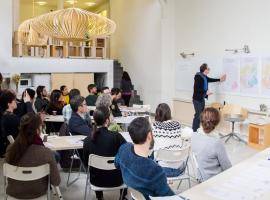Mares de Madrid: Getting citizens to design the pathways to collective employment
These proposals have come from members of the general public and seek to meet people’s needs, as identified by inhabitants in the districts of Villaverde, Vicálvaro, Vallecas and Centro (the city centre district) at the Skills Lab mapping workshops.
In recent years, under the pressure of the crisis, there have been many community-based events and economic initiatives taken in the districts of Madrid, offering a wide range of innovative community responses to the needs of citizens and neighbourhoods. The main aim of the Citizen Skills Lab is to channel the potential of all this human capital; bring it to the surface; energize it; and steer it towards new models of local economy which will create jobs and sustainable livelihoods. The Lab has made a major effort during these first months of the MARES project - firstly in methodological terms, and subsequently, in terms of working directly with members of the public at numerous meetings and workshops.
More than 220 people participated in the various meetings held up to June 2017 in local districts, first mapping out and then drafting joint economic proposals and self-employment projects, focussed on the following five sectors covered by the MARES project: mobility, food, recycling, energy and care. Participants at these mapping workshops had a small female majority (55%) and, in terms of age, almost three-quarters of the attendees were between the ages of 30 and 59.
In general terms, we can claim that initial forecasts fell short, not only in terms of the number and involvement of indirect advocates of the project but, above all, as regards the different initiatives proposed, projects presented, profiles of pre-promoter groups involved, and the breakdown of different business sectors etc.
City allotments, sustainable courier services, home food delivery, a community workshop, bartering points: the list of initiatives mapped across the four districts exceeded two hundred different projects. Thus, we can state that the result of the workshops was a great success: 250 initiatives likely to become proposals for self-employment.
As for the economic sectors, the Care Economy received the highest number of initiatives, with 44% of the total of proposals presented. Albeit at a considerable distance, this was followed by the Food sector, which accounted for 22% of the total. Third came the group, "Other Sectors", with 12% of the total.
The Recycling sector, for its part, had a 10% share of all the proposals. Mobility projects also accounted for 10%. Finally, the Energy sector saw the smallest number of initiatives, with only 2% of the total number of proposals.
As noted above, the Care sector was highly represented - partly explained by the fact that participants, in the case of initiatives that could span more than one sector, tended to classify these as initiatives for people care, preferably, rather than sector-based. For example, city allotments were mainly classified by participants as being in the care sector, rather than in the food sector. This approach has its logic, since it is seen as having a direct impact on community development in the districts.
In the energy sector, for its part, we see that citizens have varying concerns, including fuel saving and energy efficiency, renewable energies, professional guidance on construction, community-based energy or energy consultancy. In the case of the mobility sector, we noted that everything concerning city cycling was of particular importance, followed by electricity-based mobility and shared transport. Regarding the recycling sector, we see a clear predisposition towards projects related to waste collection.
In short, the inventory has succeeded in mapping the selected spheres exhaustively, while creating connectivity and laying the foundations for the subsequent development of MARES. This will be of particular help to all partners and members of the MARES project in Madrid, who now have a precise knowledge of needs, areas of potential, key players and initial project proposals in the four districts that will be running MARES.
However, all this is only a start. The work continues, and the Citizen Skills Lab will now focus all its efforts on promoting geographically based value chains that will generate both business and jobs with a hands-on approach using the resources existing, while considering the potential of the area and care-based needs of life from the viewpoint of sustainability, transformational action, and equality building.
Author: the Mares de Madrid project team’














